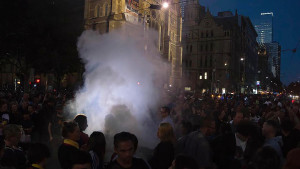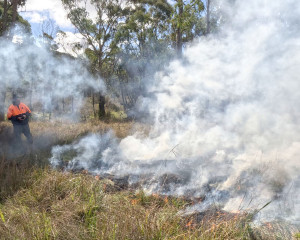This Fight in the Colonial Apocalypse
Gabi Briggs | Anaiwan
Published January 2024
When I first started writing this essay, my intention was to explore ways of transcending the colonial apocalypse. Can we fly above the fiery settler colonial landscape and seek refuge in the virtual whilst advocating for sovereignty, justice and treaty?
As I sit here now, letting the dust fall from the referendum for the Indigneous Voice to Parliament and witnessing the genocide of Palestinians being livestreamed, I am confronted with the stark reality that the colonial apocalypse is inescapable, even online. Despite the widespread mobilisation and activism facilitated by the internet, we are seeing a genocide unfolding in real-time, a brutal display of hyper-colonialism all accessible from the palms of our hands. This ongoing reckoning with settler colonialism forces me to question if escape from the flames of the colonial apocalypse is even possible.
While the colonial apocalypse licks at our heels, every breath we take on Anaiwan Country is an act of resistance. Back home, we tread lightly, trying not to upset fragile racists with our mere existence. My anxiety oscillates between a sense of helplessness and a desire to transcend this reality.
Growing up on Anaiwan Country, my anxiety is multi-faceted from navigating the colonial apparatus layered on Anaiwan Country. Occupied with responsibilities, the existential, being online and just surviving. The experience of growing up is a deepened cultural amnesia, gaslighting us into believing our survival in this colonial apocalypse isn’t predicated on power.
The Anaiwan community holds a history where our experiences of pain are remembered by us but forgotten by settlers—a mechanism of a colonial system that creates a fiction that land hasn’t been stolen and that we are entirely responsible for our people dying too young, our kids being harassed by cops, and the lack of opportunity in town.
Despite the inevitable storms of conflict and grief, my desire to be home on Anaiwan Country remains strong, fueled by a deep sense of responsibility to work with the community and rise above these challenges.
The love I have for home can never be questioned. My dream is to be back home on Country with my family. No one is funnier than my cousins, and my irbelas (mother, mother’s sisters) love me like no one else. Being on Anaiwan Country brings me joy, rest, care, and love, but growing up there was strange. I’ve felt moments of shame when Anaiwan words stumble awkwardly out of my mouth, yet I’ve also cherished moments of joy, like being part of the first cultural burn on Anaiwan Country and becoming a godparent to Maia and Leo.
This fight in the colonial apocalypse holds very little refuge from its flames, and it has left me desperate to seek safety. The omnipresence of the virtual prompts the question: Isn’t there potential for utilising it to nourish our Indigenous relationships? That if the virtual is land-based, it can also be cloaked in Indigenous relationality.
The virtual is land based and emerges not just as an extension of the physical but as a potential sanctuary—a site where we can find solace, support, and empowerment [1]. Just as we have physically found ways to achieve the impossible with limited resources, time, and money. We can do the same in the virtual realm. It is in the virtual that we can radically imagine liberation.
I contemplate the creation of sovereign servers that we birth ourselves, that we care for and love. A place where we can radically protect, imagine, archive, gather, and tell stories—a platform where we can honour protocol and hold sovereignty to foster collective kinship, ensuring that no one is left behind. This thinking led to creating IRBELA: Turn into Transcendence, which debuted at BUS Projects in 2022. It embodies the Anaiwan word for mother and mother’s sister, serving as a metaverse that preserves and shares a decade of Blak resistance stories, stories that have been relegated to anonymity by what Darumbal and South Sea Islander scholar Amy McQuire describes as the ‘White Witness’ [2].

Gabi Briggs, IRBELA: turn into transcendence, 2022. Installation view, Bus Projects, Collingwood Yards, Melbourne. Courtesy the artist, Bus Projects, Melbourne and © the artist. Photograph: Christo Crocker
Indigenous protest throughout the last decade has had a home in the virtual with a significant impact on the ground. IRBELA, a temporal physical structure, held protest videos and a Protest Book made from banner material, with contributions from diverse individuals. The connections and relationships I’ve formed here in Narrm have reinforced the power of virtual spaces for Indigenous activism and organising, where I’ve seen firsthand the impact of our collective efforts in both the virtual and physical realms.
When reflecting on the potential of the virtual, my thoughts turn to Aunty Mary Graham, a Kombumerri and Wakka Wakka woman and Adjunct Associate Professor. Aunt emphasises the moral nature of land within our worldviews, the need for relationality and interconnectedness with all life forces and that a virtual consciousness from an Indigenous worldviews embeds relational protocol that centres moral significance of land [3].
Mob have already carved out spaces like ‘Blak Twitter’ and the rotating IndigenousX account allowing selected users to reach over 77,000 followers. A quick scroll through, and you can see a profound commitment to centering Country within the virtual realm, where social media becomes a unique platform enabling unprecedented access to culture, truth-telling, and resistance. Aunty Mary Graham’s thinking resonates here reminding us that ‘Place, is a constant presence, and is consistently elevated—whether as a subject, qualifier, identity, determinant, or even as a sub-conscious, vague influence on people’s lives [4]’. Our virtual activism has a real impact on the ground, where we have seen some of the largest Indigenous Rights protests in recent times.

Stop the Forced Closures Rally in Naarm, 2015. Courtesy and © Gabi Briggs. Photograph: Gabi Briggs
‘Decolonisation is not a metaphor’; it is a call for the return to land and the pursuit of Indigenous sovereignty [5]. Successful land back campaigns serve as tangible outcomes of this pursuit, such as the recent return of the 600-acre block of Anaiwan bushland [6]. Importantly, it is through the return of this land that we were able to do our first cultural burn on Country since who knows when. This milestone goes beyond just being about acquiring territory; it is about returning back to our relationship to Country and rectifying historical injustices and dismantling the systems of settler colonialism.

First Community Cultural Burn at Nyambinga Kyuna, the land purchased back through the Newara landback campaign. Courtesy and © Gabi Briggs. Photograph: Gabi Briggs
Delving into the ethical considerations within the virtual realm reveals a complex landscape shaped by colonisation. As we navigate this space, critical questions arise about our responsibility to the lands and people whose exploitation and extraction have enabled our online existence. Further to this, the legacy of data collection on Indigenous people, marked by the racist ideologies of historical anthropological surveillance highlights the potential harm embedded in these systems. The contemporary use of facial recognition and AI-generated images further underscores the continued threat of this legacy.
In navigating the ethical considerations and challenges, the virtual terrain becomes a potential battleground for justice and Indigenous rights. Bridging the gap between the virtual and the demands for justice necessitates aligning virtual developments with Indigenous knowledge, lore, protocol, and relational kinship systems. Approached ethically, the virtual landscape holds the potential to significantly contribute to the broader struggle for justice and land rights, becoming a powerful tool for reshaping narratives, fostering connections, and amplifying the voices of Indigenous communities in their pursuit of justice and sovereignty.
The ongoing dialogue on decolonisation extends beyond rhetoric, with demands for sovereignty, treaties, and land rights at its core. It demands recognition of Indigenous knowledge, lore, and relational kinship systems, challenging settler society’s perception of the virtual as mere capital. As Indigenous resistance continues, the potential for a future aligned with Indigenous ways of knowing and being remains a critical avenue for exploration.
For me, the virtual is not a mere mirror but an extension of our lived realities. It is within the virtual that social media platforms become strategic tools in our arsenal, operating in tandem with our worldviews, relationality, and kinship. It is through these platforms that we engage in the fight for life. Our resistance is not just for survival but for the flourishing of Indigenous cultures, lands, and lives.
The virtual, much like the sacred terrain of Country, is a battleground of the colonial apocalypse, where we challenge settler colonialism and assert and envision a sovereign Indigenous led future. Our actions in the virtual realm are not divorced from the struggles of Country; this convergence of the virtual and the physical is where our fight for life, culture, and sovereignty finds its strength.
Morford, Ashley Caranto and Ansloos, Jeffrey, Indigenous Sovereignty in Digital Territory: A Qualitative Study on Land-Based Relations with #NativeTwitter, AlterNative: An International Journal of Indigenous Peoples 17, no. 2, 2021, p 293–305, https://doi.org/10.1177/11771801211019097.
Amy McQuire, Black and White Witness, Meanjin, Winter 2019.
Graham, Mary, Understanding Human Agency in Terms of Place: A Proposed Aboriginal Research Methodology, Philosophy Activism Nature, no. 6, 2009, p71–78. https://search.informit.org/doi/10.3316/informit.590560058861546.
Graham, Mary, Understanding Human Agency in Terms of Place: A Proposed Aboriginal Research Methodology, Philosophy Activism Nature, no. 6, 2009, p71–78. https://search.informit.org/doi/10.3316/informit.590560058861546.
Tuck, Eve and Yang, K. Wayne “Decolonization Is Not a Metaphor,” Decolonization: Indigeneity, Education & Society, January 2012
Tom Plevey, ‘On our own terms’: Anaiwan people look to buy 240 hectares of bushland to reclaim country, The Guardian, February 2022 https://www.theguardian.com/australia-news/2022/feb/23/on-our-own-terms-anaiwan-people-look-to-buy-240-hectares-of-bushland-to-reclaim-country
Biographies
Gabi Briggs is an Anaiwan gedyura, a research-based artist, weaver, and community organiser. Her practice reflects a commitment to returning back to Indigenous knowledge and engages with the complexities of race, power, and truth-telling through her art, seeking to restore Indigenous sovereignty and enact self-determination.